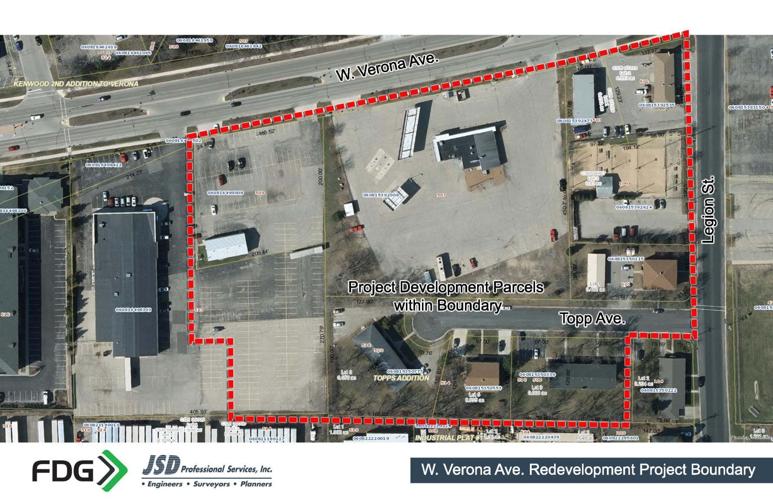The likelihood of a vacant, fenced-off 10-acre area along West Verona Avenue becoming apartments, a hotel and retail shops beginning this year improved considerably Monday, Feb. 10.
After three years of negotiations with Forward Development Group, the Common Council – a group that has changed almost entirely since the start of those discussions – agreed to pay $3.2 million to the company to get rid of soil contamination and build public infrastructure to serve the Sugar Creek Commons site.
“I’m happy to see this move along,” Mayor Luke Diaz said before the unanimous vote. “This property has been blighted for years.”
Over the decades, the area had been home to a truck stop, auto repair shop, car wash and volleyball court.
The truck stop, operated most recently as the Chinmi restaurant and gas station, was abandoned about seven years ago.
FDG had to assemble 10 individual parcels to create the project, which features 284 apartments, 26,000 square feet of retail and a 110-room hotel and conference center, all of which were approved by the city last year.
The money will come from a tax-increment financing district the city created in September 2017 specifically for the project, and it will reimburse the developer only as property taxes are paid to the district.
That district – created by a previous mayoral administration with six of eight alders having since left – allows the city to spend up to $9 million of tax increment for Sugar Creek Commons, other potential nearby projects and related infrastructure.
Tax increment is the combination of property taxes paid from all underlying taxing districts (school district, city, county and technical college district) on the increased value of the property, meaning construction on the site will have to exceed the value it had previously before the developer will get any rebates.
TIF is widely considered to be the only powerful economic development tool cities have.
“This means if the developer does not build anything, as sometimes the developer doesn’t, the city’s not on the hook for anything,” Diaz told the council.
Contingency plans
Verona-based FDG now has three major projects ready to start in Verona, including the 200-acre northside Whispering Coves subdivision, which also got a developer agreement approved Monday.
The other is a 100-unit senior housing complex on North Main Street that got its first approval nearly three years ago before being revised last spring, but has yet to have ground broken.
Alders chose not to go into closed session, with Diaz pointing out that being a final agreement, there would be no bargaining position to protect. Alders asked several questions about legalities of the deal and how it will ensure completeness of the public improvements once they begin.
A memo included in the city’s meeting packet Monday states the developer anticipates starting construction in the spring, though language in the deal suggests that won’t happen before June 15 – a week after the Hometown Days parade route ends on that corner. The deal also requires the developer to finish public improvements by the end of the year and to provide a letter of credit that would allow the city to finish the improvements – mostly rebuilding the Legion Street intersection and adjacent roads – if they are started but not complete by next summer.
The city could also cancel the agreement at that time if no progress is made.
FDG representative Ron Henshue told the Press last fall the company had every approval needed from the city and state except the developer agreement.
In late May 2019, the company tore down all the buildings on the site other than the four apartment buildings in the back, and Henshue told the Press in June he hoped it would start construction within a month or two. But several closed sessions of the council in the ensuing weeks analyzing the numbers and discussing proposed terms yielded no deal, and talks seemed to stall shortly before the city passed its budget in November.
TIF justification
The use of TIF requires a legal justification that the improvements would not happen without its use, and typically, it must be a project the municipality considers a public good of some sort.
One justification for this investment would be the removal of a former truck stop city leaders have repeatedly called a blight on the area. Such projects bring a cost for demolition and often for soil remediation, as gas tanks below it almost certainly leached into the ground.
FDG has reported its soil testing of the site indicated it would not be more expensive than it projected initially because the site is closed to 20 feet – meaning no further action is required. The underground parking for the hotel and conference center is the only construction planned in the truck stop area and would not go more than 14 feet deep.
Another justification for TIF might be the difficulty of assembling several parcels with different owners to create a viable project, but that aspect of the deal drew resistance from city leaders over the past several months.
Some alders and the mayor said they did not consider the planned relocation of residential tenants a public good, so the 141 units that would replace the four buildings still standing along Topp Avenue are not part of the TIF deal.
City administrator Adam Sayre told the Press that FDG’s request for TIF incentives in the developer deal was $5.6 million plus another $565,000 as recently as September 2019. In addition, the new deal, unlike the original request, does not put any money up front.



